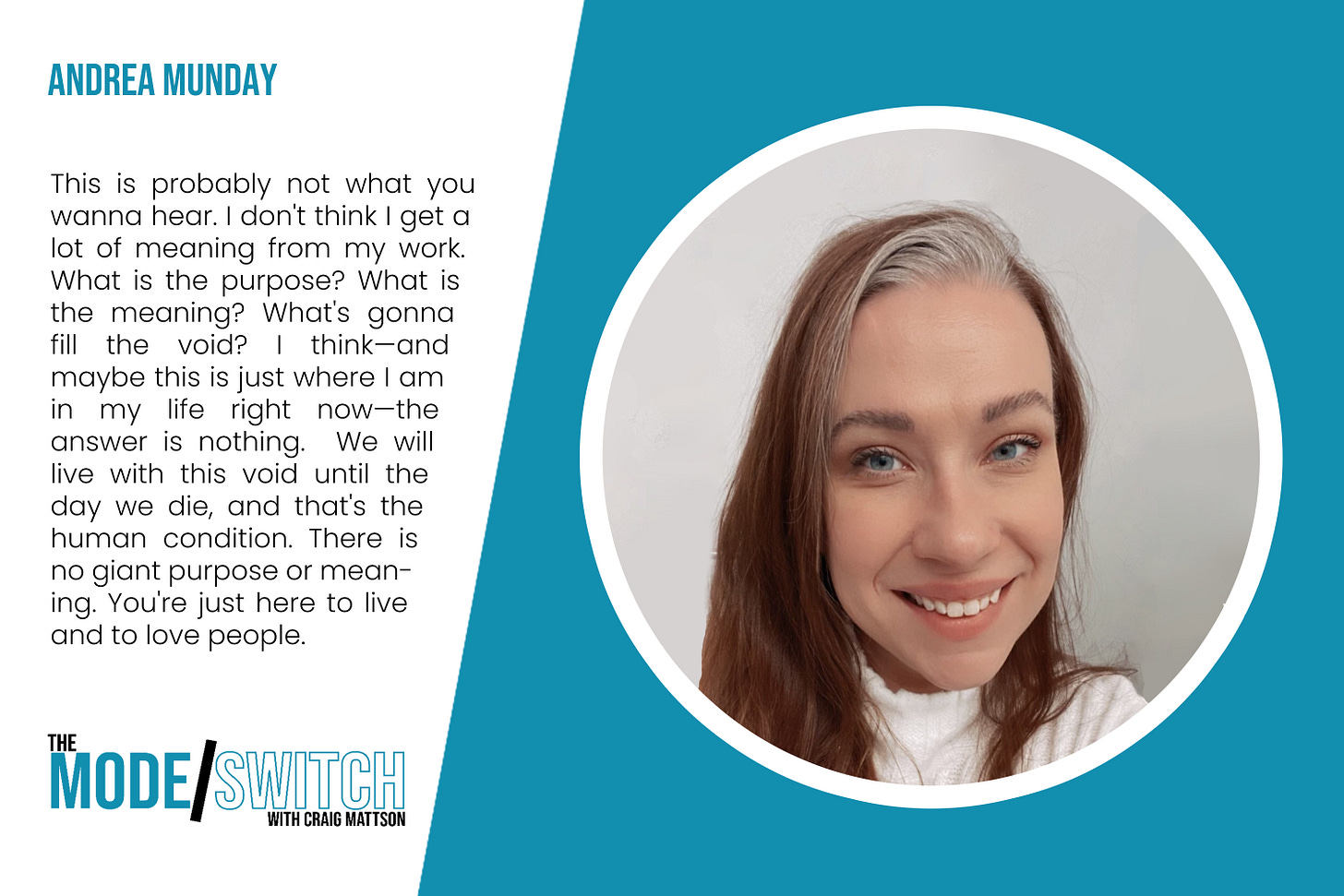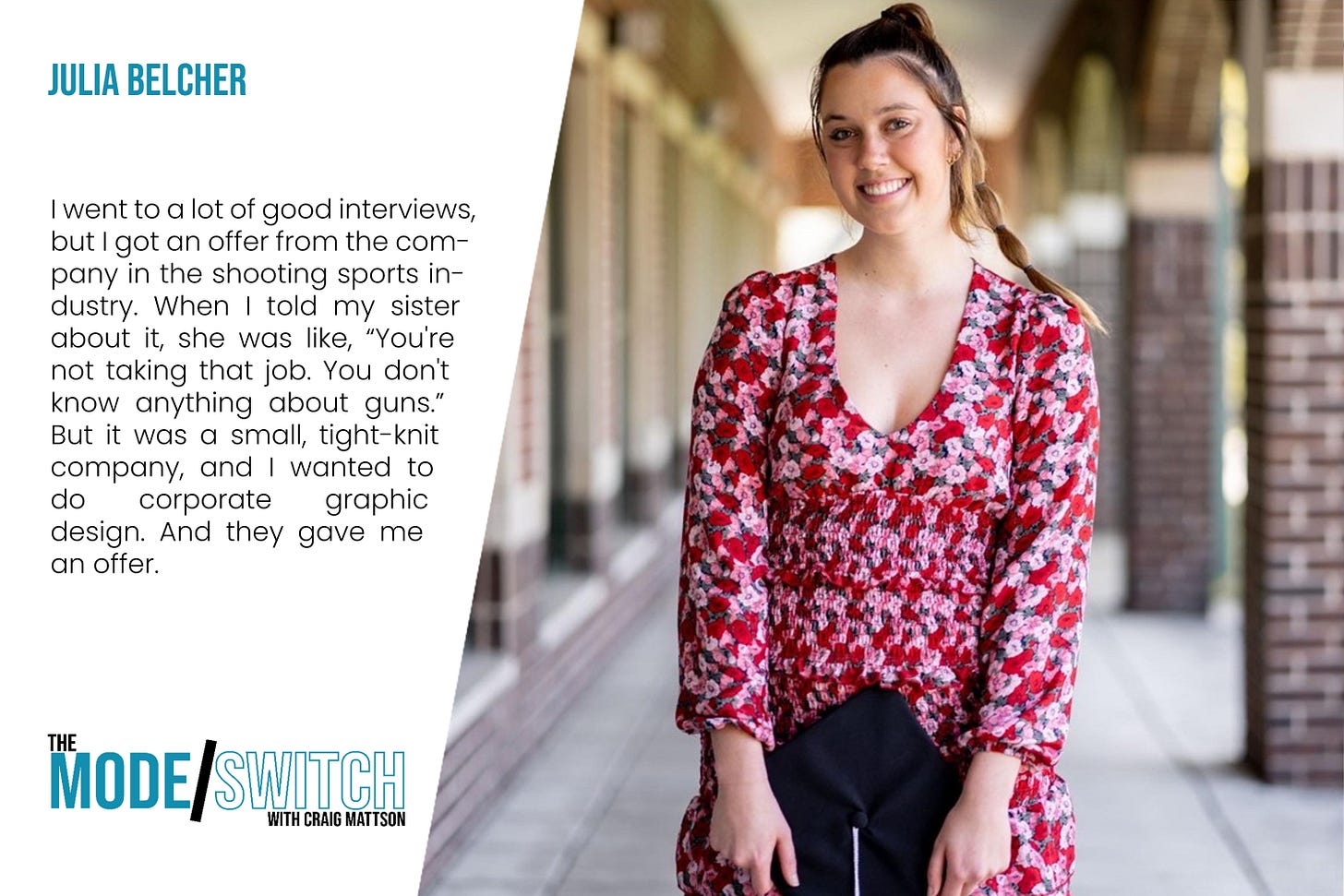Odds are, if you’re an early-career professional, you’ll be changing jobs soon. I don’t have a crystal ball, but I do have social science. A Robert Half study suggests that younger workers tend to admire job-switching more than their older counterparts: 75% of Gen Zs and millennials (more specifically, people from ages 18 to 34) think job-hopping is strategically smart. When Ripplematch researchers asked Gen Zs in the class of 2018 how long they saw themselves staying with their current job, the highest number of respondents said 1-2 years. So, yeah, you’re probably up for this particular mode switch soon.
Job-hopping doesn’t seem good for you or your company. It laces your resume with a potential flakiness. It deprives your company of knowledge capital. And it takes a lot of emotional labor. But there is something good that comes with job-hopping: it forces everybody involved to think about their stories.
Here’s why that’s good: the work of telling and hearing stories corrects for confirmation bias. Cognitive psychologists suggest that, for the most part, we suck at rational decision-making. Faced with choices, we grab one and then justify that grab. As David McRaney notes in his book How Minds Change, “Because we are biased and lazy, when we argue with ourselves, we usually win. We draw self-serving conclusions based on our unique experiences and motivations, and then we employ reasoning to create justifications and rationalizations for our own thoughts, feelings, behaviors, plans, and goals” (192). That’s called confirmation bias. Odds are, you can detect that bias in your decision-making about job-switching—at least at first.
“Because we are biased and lazy, when we argue with ourselves, we usually win. “ - David McRaney
The best way to diminish that bias is to try to tell your story persuasively to others—and then to be open to being persuaded by others. And that’s precisely what you do as you narrate your career to ever-widening circles—first to your partner or roommate, then to your coworkers, then to Monster.com and then to a spreading audience of potential employers. In each case, you present your (probably biased) rationalization for the job-switch and, as you feel the force of others’ (probably biased) objections, you gradually work towards the story that makes the most sense. In other words, the process of narrating your career choices to diverse audiences moves you gradually from decision rationalization to rational decision-making.
You can see how this process is good for your individual choice-making. But I’m also making a second claim: that honing your skill as a storyteller is good for your workplace community. Your manager, your coworkers, your clients—each of them is just as good at rationalization as you are. That means they each hold a few stories about how the world works—and each avoids looking for other stories about how the world works. But when you bring your personal narrative to the workplace table, your story inevitably alters their story collection. You revise and refine their overall narration of What’s Going On at Work.
Hopefully, your storytelling gets you the new job you need. But I also hope your storytelling brings a mode switch in the overall company. I think that can happen if what you narrate helps managers and HR offices and directors of programs to hear four under-heard stories. (Shout out to W. Barnett Pearce and Vernon Cronen, a pair of communication theorists whose research taught me to hear these kinds of stories.)
Unheard stories
An unheard story is one that’s being told but ignored. Sometimes that’s a story in your own head. Andrea Munday told me that after her divorce at age 29 and then her quiet departure from the church, she was suddenly able, as she put it, to hear her own thoughts, her own unheard stories. Eventually, this capacity to listen well to her own life enabled her to succeed as a marketer, where it became important to listen well to the lives of others. But she’s also learned to hear a too-often unheard story about work itself. A lot of millennials grew up hearing the story that, if they chose a job they loved, they’d never work a day in their lives. All too often, that tale leads to burnout. Andrea has learned to tell a different, less-often-heard story, that your job doesn’t always provide you with Your One Purpose in Life. Instead, she finds volunteer or pro bono projects that enable her to infuse small moments of meaning in the everyday. For example, she’s done pro bono work for the Black Panther Cubs in Maywood, Illinois to honor Fred Hampton, a Black Panther party chairman killed by the FBI.
Unknown stories
This kind of story’s hidden. Julia Belcher helped me spot just such a story, when she talked about keeping her politics quiet at work. She’s a graphic designer and social media manager for Orion Wholesale, a gun distributor in Jeffersonville, Indiana. She told me she feels lucky to have gotten this job immediately after college, and she loves the collegiality the company fosters. But there is a part of her story that she keeps quiet in company conversations: what she describes as her somewhat progressive political commitments. Some Gen Zs are more politically outspoken at work. But I’ve noticed among other early-career professionals that it’s not always easy to figure out just how often your deepest convictions should show up in the workplace. (Want to read more about this? Check out this podcast conversation.) Julia says she’s glad to be a corporate graphic designer but that, for now anyway, this narrative is one she feels should stay unknown.
Untellable stories
Strictly speaking, I suppose, no story is untellable. But some stories can be nearly unbearable to say, especially when they prove to be conversation-stoppers altogether. Eric Freeman is a Grand-Rapids-based social entrepreneur, launching a company called Mindset Meals. Unlike Andrea, he’s driven by a single, unifying purpose: to improve how people feed their minds by changing how they feed their stomachs. But he also relates a painful moment earlier in his employment history when he had moved steadily and successfully through a series of interviews for a company he wanted to work for and that very clearly wanted to hire him. And then, just at what looked to be the last conversation, the interviewer asked him about his history with incarceration. That is indeed a part of Eric’s past. But until things change for the better in U.S. hiring policies, it’s an untellable or, at the very least, an unhearable story.
Untold stories
Bre Rodriguez speaks about being prayerfully led into the field of communications to tell the world who God is. Today she works as a marketer in the beauty industry, where she seeks to make the image of God known to many. I have a hunch that just about anybody would find her story compelling. Good for you! You found your purpose. But in the course of our interview, she also helped me notice an untold story about how chronic illness shapes life and work. Bre’s sister suffers from such an illness, a sometimes overwhelming reality that has has continuously affected Bre’s professional life. Painful as it’s been, this shared suffering been a source of moral strength for Bre as well. She notes that, at one time, she was a direct, sometimes too direct, person. But the experience of living with and caring for her sister has taught her to move slower and extend more grace with her coworkers. I was struck that as important as chronic illness is in the lives of so many people, it’s not a narration I hear about much at work. Bre makes me think that should change.
One of the gifts of changing your job is that it forces you to deal again with those stories—unheard, unknown, untellable, untold—that you carry around with you from cover letter to cover letter, interview to interview, workplace to workplace. The challenge of being an integrated personality in today’s changeable economy means figuring out how to turn the “un-stories” of your life and work into the “in-stories” of your workplace community.
I’m afraid this newsletter puts too much responsibility on you, as if the only mode switch I’m recommending here is that you spill all your tea during your first-tier interview. Gen Z workers are teaching the rest of us that more things are sayable at work than older generations used to imagine. But there are occasions when it’s just not safe to share your story. I was impressed by this recently in talking with an interviewee who said that being Black and a woman in America has sometimes meant braving the threat of violence from from people who should have been colleagues. (I’m still mulling over that story. It’s too soon to write about it more fully than that.) You will no doubt develop the tacit sense of when to share and when not to. For today, maybe, it’s enough to be mindful that in every interview and on every shift, there are more stories to tell than can be easily told.
The mode switch commended this week is both personal and shared. You have a role in it, as your next job-hop refines your curriculum vitae and corrects for confirmation bias. But ultimately, this narrative work is something we have to learn to do together, listening everyday for all the hidden stories.
-craig








